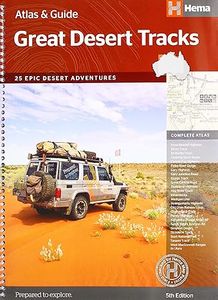Productomschrijving
Whether you're a desert lover or just looking to tackle some of Australia's favourite 4WD destinations, the Hema Great Desert Tracks Atlas & Guide - Edition 5 is an indispensable companion to this country's arid centre. The complete atlas contains Hema's entire Great Desert Tracks map series. The guide features 25 4WD tracks, each with its own detailed map inset showing the route taken, with GPS location and points of interest featured. All of the tracks are colour-coded to make it simple to find the treks that suit your type of vehicle and handy symbols show towing suitability also! The track descriptions are written by some of Australia's top four-wheel driving enthusiasts and experienced travel writers. Each track's notes contain all the information you need to plan for the trip, including permits and contact details. There's also plenty of essential pre-trip reading on how to prepare for your trek, safety in the outback and driving techniques! Features Contains Hema's entire Great Desert Tracks 25 4WD tracks Detailed inset maps Pre-trip tips Background information on geomorphology, major environments and ecosystems Flora and fauna guide Australia's Great Desert Tracks Atlas and Guide: an A4, spiral-bound road atlas, based on the Hema's highly acclaimed series of maps covering the outback, with descriptions of 25 4WD treks across Australia’s 20 deserts. The opening section provides a general introduction, illustrated with photos and maps on temperature and rainfall, plus safety tips for driving across such a demanding terrain. The next sections has a description of each desert and its best routes presented on map extracts, indicating their length, longest distance without The last section contains a road atlas with cartography specially prepared by Hema using base maps from Geoscience Australia, the country’s national survey organization. The maps show roads and 4WD tracks, as well as very rough tracks which often become overgrown and may be difficult to follow. This information is divided into two groups: roads and tracks which were plotted with a GPS and computer during the fieldwork carried out by Hema, plus other tracks shown on the GA’s 1:250,000 topographic survey maps and on other sources, but not specifically verified by the publishers. The maps also show railways with stations and man-made features important for orienteering: disused railways, vermin proof fences, towers, gates, cattle grids, wells and waterholes, etc. Altitude colouring indicates the terrain, with parks and reserves, aboriginal lands, registered heritage areas, defence and restricted entry areas all indicated by colours. Permanent and mainly dry or salt lakes, sand ridges and cliffs are marked. The maps have a grid at intervals of 30’ with ticks at 5’. GPS coordinates are given for important junctions, isolated accommodation facilities, etc. An extensive range of symbols indicate tourist information: various types of accommodation, camping areas with facilities, stores, drinking water, medical facilities, petrol stations indicating types of fuel sold there, mechanical and tyre repairs facilities, etc. Also included are contact details for emergency services and tips for traveling across such a demanding terrain.











